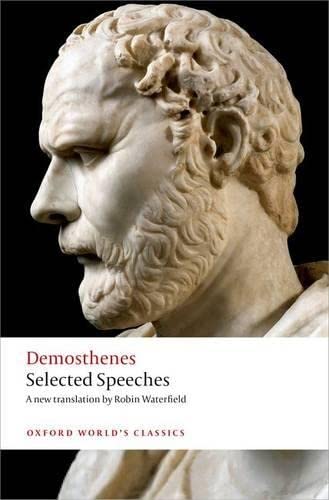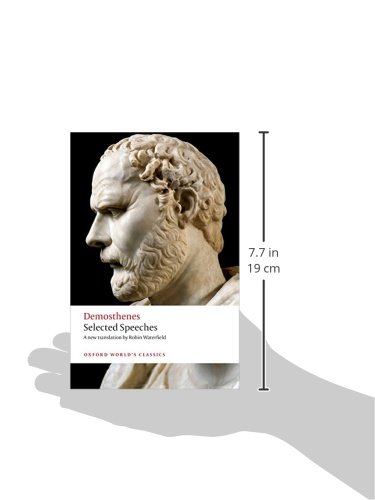Customer Services
Customer Support

Desert Online General Trading LLC
Warehouse # 7, 4th Street, Umm Ramool, Dubai, 30183, Dubai
Copyright © 2025 Desertcart Holdings Limited



Selected Speeches (Oxford Worlds Classics)
D**N
The book I was looking for
The book is as described, and was delivered when scheduled.
B**W
Communication at its finest
Fantastic selection from the great orator himself. A true must buy.
L**.
pretty cool.
Book was a bit hard to digest but if you tried hard enough you can imagine yourself being a lawyer in the ancient Greek times, pretty cool.
R**U
Five Stars
Great!
J**L
Valuable source for history of Philip II of Macedon
This is a translation by Robin Waterfield of a selection of Demosthenes' extant speeches. Like all of Waterfield's many translations, the English style is good. The translation you use matters greatly and Waterfield's is always either the best translation or among the best translations (e.g., I prefer Cornford to Waterfield for Plato but both are excellent.)Most of what we can establish about ancient Greek political history comes from the manuscript tradition: Herodotus, Thucydides, Xenophon, Polybius, Diodorus Siculus, Strabo, Plutarch, Arrian, Pausanias, together with a few writers on philosophy and antiquities like Diogenes Laertius, Athenaeus (Deipnosophistae) and Dio Chrysostom, minor technical writers like Aeneas Tacticus and Polyaenus (Stratagems), and also some Latin writers like Quintus Curtius Rufus. Then there are some fragments of works on papyri, like Xenophon’s Hellenica and the Hellenica Oxyrhynchia. Then the next biggest source for Greek political history are inscriptions: the best collection of translated inscriptions for the period of Demosthenes is Rhodes, Greek Historical Inscriptions, 404-323 BC . Finally, there are some facts that are established by archaeology. For example, a rich collection of archaeological reports for Athens is the “Athenian Agora” series of monographs of the American School of Classical Studies at Athens.But Xenophon goes up to the Battle of Mantineia in 362 BC, before the accession of Philip II in 359 BC. And Arrian starts with the accession of Alexander after Philip II was killed. For Greek political history during the reign of Philip II, speeches of the Athenian orators are some of the only extant sources we have.I am interested in intellectual history and the history of arts and crafts, not political and military history except for logistics, geography and finance. Most of the public speeches are only of interest for political and military history and for the history of Greek rhetoric. The two big subjects in classical education were grammar and rhetoric, and the writings of Demosthenes were by orders of magnitude more widely read and studied than Plato or Euclid. The best way of seeing this popularity is how many papyri have passages from orators and Homer and how few have passages from abstract works like Plato’s Parmenides and Euclid’s Elements.For social history, Demosthenes’ private speeches are probably more valuable than the public speeches about Macedonia and elite squabbles with Aeschines. For example, in the First Speech against Aphobus, speech 27, Demosthenes calculates the value of his father’s estate and the principal and interest that is owed to him by the three trustees. The most substantial book I've found on lending in ancient Greece is Paul Millett, Lending and Borrowing in Ancient Athens , which cites several of Demosthenes' speeches that involve lending.
A**R
A good, idiomatic translation
A good, idiomatic translation. Sometimes, it is difficult to relate the translation to the original Greek, but I suppose that is a price to be paid for it being idiomatic.
Trustpilot
2 weeks ago
3 weeks ago
2 months ago
3 weeks ago